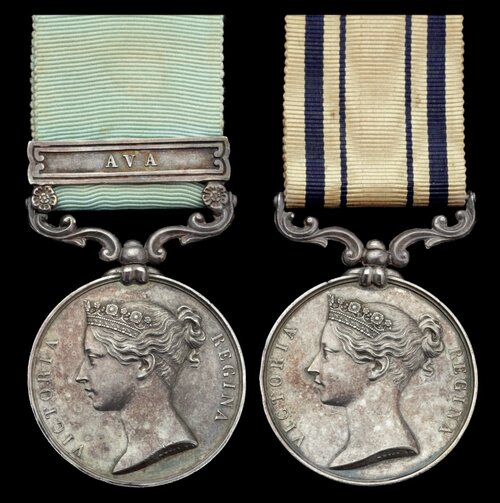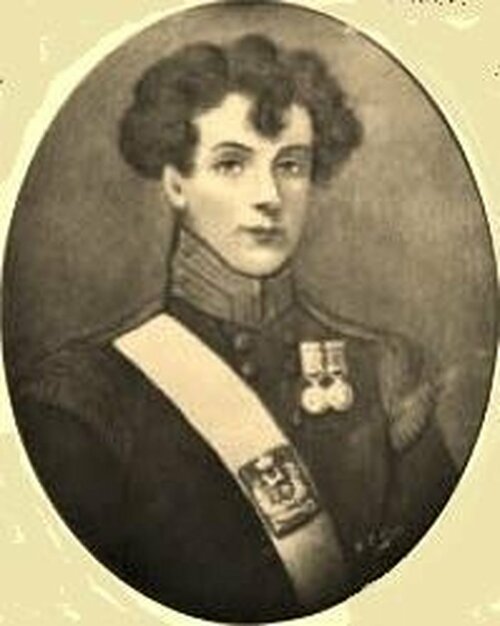Auction: 21001 - Orders, Decorations and Medals (conducted behind closed doors)
Lot: 424
A tragic pair to Captain Sir R. Stanford, 27th Regiment, late 45th Foot and a South African Pioneer whose struggles with his neighbours and the government saw him made destitute.
Army of India 1799-1826, 1 clasp, Ava (Ensign R. Stanford, 45th Foot.); South Africa, 1853 (Capt. Sir R. Stanford. 27th Regt), bruised, contact marks, nearly very fine (2)
Robert Stanford was born in 1806 at Ballina, Ireland, the son of a Major Stanford. He was clearly destined for a military life from a young age, holding an army commission in the Cape Regiment from the age of 10 which he took up on 24 July 1816. Robert began his career in earnest at the age of nineteen when he was promoted to Ensign with the Cape Regiment on 26 March 1825.
He saw action in the First Anglo-Burmese War with the 45th Regiment. During this campaign the 45th suffered so severely from cholera that they were unable to take part in the early stages of the fighting. But a detachment of four companies were able to join Colonel Pepper's column in the capture of Sittang. In 1832 Robert married Eloisa Mathilda Ann Boardman, daughter of Major General Edward Boardman of the East India Company. The couple had seven children, five boys and two girls with the eldest Edward being born in England before Robert's next campaign began.
Having been promoted to Lieutenant, Robert was transferred to the 89th Regiment before being promoted again to Captain, unattached. On 5 April 1833 he joined the 27th Inniskilling Regiment serving in South Africa during the Frontier Wars. This war, fought against the Xhosa people took place over a wide front resulting in a good deal garrison duty in frontier settlements and occasional punitive or retaliatory raids. It seems likely that Robert decided to settle in South Africa while he was serving here. He was known to have an interest in agriculture and the sight of fertile and unoccupied land must have appealed to him.
At the conclusion of the war in 1838 he decided to retire on half-pay and emigrated to Cape Colony. Once there he purchased a 27,000-acre estate called Kleine Rivers Valley from a Major Samuel Parlby, after the death of the latter's wife, for £3000. This allowed Stanford to exercise his passion for agricultural which he did by replacing the old 3-bag mill with a much larger mill capable of filling 24 bags of grain per day. He also built dams to increase the amount of workable land and purchased a small cutter to help transport his produce to Cape Town. The construction effort for the mill was so great he needed to engage the services of a ship's carpenter by the name of John Moore. The farm soon began to prosper and Robert was able to acquire a Town house at Stal Plien in Cape Town and two other farms. By 1848 he was able to buy another two farms called Gustrouw and Fortuintjie near Gordon's Bay. Finally he elected to settle down in Gustrouw and leased the Kleine Rivers Valley to another Half-Pay Captain by the name of Thomas Smales.
Robert might have been forgiven for believing that his fortunes had been secured. However everything changed for him when, on 19 September 1849, the ship Neptune arrived in Simon's Bay. This vessel contained Irish rebels captured after the failed 1845 rising. The British Government had decided to deport these rebels to Cape Colony, a move which infuriated the local colonists. Their view being that the men aboard the ship were convicts and that their presence would make the Cape a Penal Colony. A demand was made that they be sent elsewhere, this was backed up by an agreement that nobody would provide any aid which might be given to the luckless prisoners. This situation created a stand-off between the Government and the Colonists with no Government institution being provided with food for fear that it would be used to feed the prisoners.
Sir Harry Smith, then Governor of Cape Colony, began to grow desperate. Since Robert was still a Captain on half-pay, Smith sent the Attorney General to inform him that it was his duty to supply the government. Robert responded that he had already agreed to take part in the Colonist's embargo and couldn't provide the supplies Smith needed. Unfortunately the Governor had reached the end of his tether. The Attorney General informed Robert that unless he sent supplies a state of Marshal Law would be declared and troops sent to take what was needed. This put Robert in a difficult position, he knew that neither side was liable to back down and if Smith carried through his threat it would doubtless lead to bloodshed.
"His reason for doing so was that he felt sure the Home Government would not alienate a valuable colony like the Cape by forcing the convicts upon it, while his refusal would have caused an immense amount of bloodshed, besides leaving incalculable mischief behind in the evil feelings engendered; for the colonists had might, and, up to a certain extent, right also, on their side."
(London Evening Standard, 08 January 1878, refers)
Caught between the two sides he decided to send the supplies, however he made certain to ensure that the Government granted him a full indemnity for his assistance. The entire affair came to nothing in any case as the ship was ordered on to carry the prisoners to Tasmania.
The upshot of Robert's actions was complete ostracisation from Cape society. Businesses were closed to him; his neighbours would not trade with him and even the doctors refused to treat him or his family. Not content with simply cutting him out of society they also began to place pressure upon him both personally and professionally.
"His labourers and servants were forced to desert him, his lands were laid to waste, no Bank dared do business with him, and the most vexatious demands were made upon him for immediate payment of all outstanding debts"
(London Evening Standard, 08 January 1878, refers)
Despite the promise of indemnity from the Governor, nothing was done to protect him from the steady train of abuse direct at his family by his former friends. The culmination came when one of his children fell ill and Robert, hurrying to town could find neither medical aid nor transport to bring his family to him. When a carriage was finally precured, with the help of the Governor, it proved too late and he learned that his wife was coming to join him with their dead child.
In desperation Robert decided to take the matter up with the Minister of Colonies and in June 1850 he took ship for Britain. Here he received no monetary compensation for the damages he had suffered but was instead knighted for his services. This honour did little to help his situation and the next year in June 1851, he again travelled to Britain where the Prime Minister Lord Russell had promised him employment. The government provided him with 5,000 pounds to settle his affairs on the coast, this support while generous was nothing like what Robert needed to cover his debts.
"Lord Russell directed 5000l. to be paid to Sir Robert Stanford, and offered him 'some suitable public appointment in compensation for a loss of at least 40,000l., which Sir Harry Smith had declared was a sacrifice which, at the moment, he had no means of estimating'… They followed up the 5000l., which was a dribblet, with 250l., which was an impertinence, and withdrew their promise of an appointment to public service"
(London Evening Standard,13 August 1866, refers)
Robert returned to the Cape in November 1852 to discover that Captain Smales, the man to whom he had leased the Kleine Rivers Valley farm, had run it into the ground. Anything which could raise money had been sold and all the prime timber had been cut down. He began legal proceedings against the Captain but the former tenant soon declared bankruptcy leaving Robert with only the ruined farm which, he judged, was beyond repair.
The pressure of managing his affairs was starting to wear on Robert and he appointed an agent by the name of Johan George Steytler to manage the farm. However in early 1853 he discovered that this man had, possibly as the result of corruption, acquired a herd of cattle which were infected with a fatal lung disease. The effects of discovering this further betrayal caused Robert to suffer a stroke, meanwhile further mortgages were taken out to cover the loss of the cattle. In poor health Robert passed the management of his affairs on the Cape to a friend and fellow Irishman named George David Brunette and left for England. No sooner had he left then his properties began to be sold for suspiciously low amounts of money. Several farms and estates valued at 5,000 pounds went for 3,000 and it was only when Robert's eldest son Edward discovered that the Kleine Rivers Valley was up for sale that the ruse was discovered.
Sadly it proved too late and the final estate was sold for 3,000 pounds reducing the family to a state of 'genteel beggary'. Despite his poor health and the terrible cares placed upon him in life Robert lived until the age of 70. He died of a Spinal disease at Charlton Upon Madlock, Lancashire on 20 December 1877. At the time of his death his estate was valued at less than 100 pounds.
The farm, sold to one Philipus de Bruyn, is now known as Stanford Valley and sits outside the small town of Stanford; sold together with copied research, including regimental histories, biographies and death register. Also a number of copied photographs and images of the Kleine Rivers Valley farm and the modern Stanford Valley farm.
Subject to 20% VAT on Buyer’s Premium. For more information please view Terms and Conditions for Buyers.
Sold for
£2,900
Starting price
£1900







